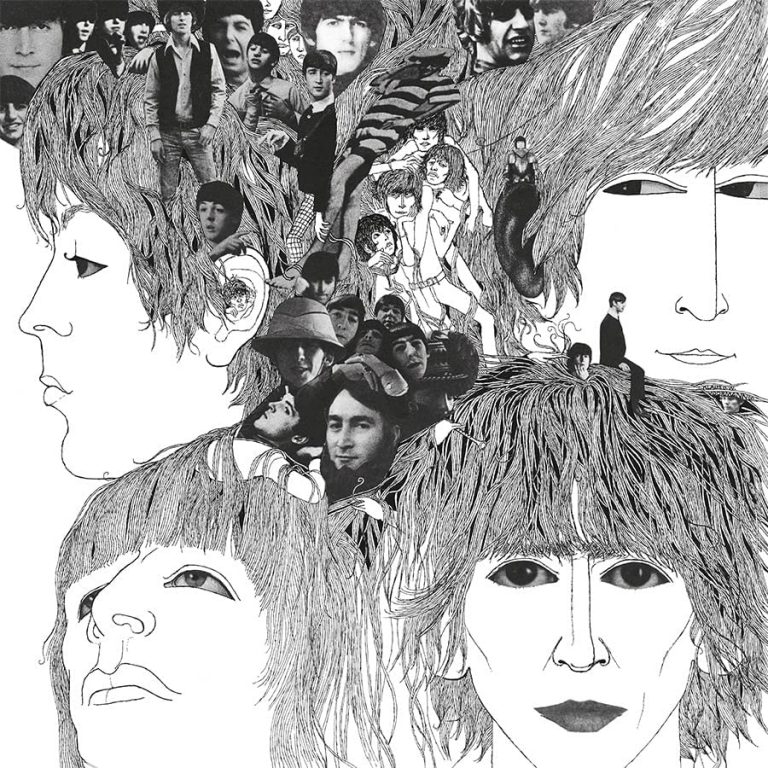
Wednesday, September 7, 2022
“Revolver” reissue announced
Last updated on December 22, 2023

Wednesday, September 7, 2022
Last updated on December 22, 2023
Article Sep 03, 2022 • "The Beatles: Get Back" wins five Emmy Awards
Concert Sep 03, 2022 • Taylor Hawkins Tribute Concert
Article Sep 07, 2022 • "Revolver" reissue announced
Article Sep 13, 2022 • Paul McCartney writes letter to rescue abused Indian elephant
Article September 24 - October 1, 2022 • "Mike McCartney's Early Liverpool" photo exhibition
Revolver (Super Deluxe - 2022)
By The Beatles • Official album
From 2017 to 2021, Giles Martin remastered and remixed “Sgt. Pepper’s Lonely Hearts Club Band“, “The Beatles“, “Abbey Road” and “Let It Be“, to celebrate the 50th anniversary of each release.
In August 2022, rumours started to spread about the next instalment of those Beatles reissues.
On August 1, Beatlefan Magazine reported: “We’ve heard from two sources that a multi-disc “Revolver” box set is planned for Oct. 26 or Oct. 28. There has been no official confirmation on this.“
On August 25, Variety Magazine announced that “Apple Corps and Universal Music have confirmed that a deluxe celebration of the 1966 release — which, like the Beatle boxes that have preceded it, will include a Giles Martin remix — is in the pipeline for this fall“.
On August 28, Giles Martin retweeted Variety Magazine, with the comment “I really hope you all like it“, confirming the imminent release.
On September 5, Ringo Starr published a video on the Instagram social network, showing off the upcoming “Revolver” box set.
The official announcement came on September 7, 2022.
This release was made possible thanks to demixing technology built by Peter Jackson’s team during the making of “The Beatles – Get Back” documentary.
From Variety, August 25, 2022:
The suspense over which album by the Beatles might be next in line to get a remix and bonus-filled boxed-set treatment is over: It’s officially “Revolver.”
Apple Corps and Universal Music have confirmed that a deluxe celebration of the 1966 release — which, like the Beatle boxes that have preceded it, will include a Giles Martin remix — is in the pipeline for this fall.
An official announcement of the project is not expected to come until some time in September, at which point details about the deluxe package’s contents and a release date will be forthcoming. […]
Some Beatlemaniacs had been skeptical, however, that Apple would be able to produce remixes of the pre-“Sgt. Pepper” albums that match what Martin had already done with the latter part of the band’s catalog. This was due to the fact that the albums through 1966 were recorded to more basic four-track masters, where multiple instruments or vocals were often squeezed into a single track. At a time when mono was still considered the standard, the stereo mixes prior to “Pepper” often sound bizarre to the modern ear, with key elements relegated entirely to the left or right side results, which is why many Beatles fans relish finally getting a more holistic mix of “Revolver” and the albums that preceded it (although, as always, there will be conscientious objectors among the fandom).
When Variety spoke with Martin in the fall of 2021 about the prospects of doing remixes for the pre-’67 albums, he made it sound like he thought the moment was nigh to tackle them, although he said he wasn’t yet underway on work on any of them. […]
I really hope you all like it…. X
Giles Marting – Retweeting the Variety article, and confirming the “Revolver” reissue – August 28, 2022
From Beatlefan, September 2, 2022:
Universal held a Los Angeles listening session for the upcoming “Revolver” release this week. Interestingly, a Dolby Atmos mix of the album was played, although that mix will not be made commercially available. Producer Giles Martin was on hand, and talked about how, previously, the problem with trying to remix “Revolver” is that, on one track, you might have drums, bass and rhythm guitar, and you couldn’t separate them. But, with the audio software developed by Sir Peter Jackson’s Wingnut Films for “The Beatles: Get Back,” they can take any instrument off a track and place it anywhere in the mix they want. In other words, the Jackson software gave them the ability to do a real remix of the album. A few of the outtakes to be included also were previewed at the listening session. Among the outtakes set for the new box set is an early version of “Yellow Submarine” that features Lennon singing the unfinished number while playing acoustic guitar — an indication he was much more involved in the song’s creation than previously had been believed. Look for the “Revolver” box set reissue to be announced officially by Universal/Apple Corps this month.
There are people who insist a transformative remix couldn’t be done on the pre-4-track Beatles albums because of so many elements being blended into the two basic tracks. But of course, Beatles fans do speculate pretty much across the board: Is there an opportunity to do something with “Revolver” and “Rubber Soul,” now that you’ve gone through the Beatles’ timeline from “Sgt. Pepper” forward?
I think there is. I think we have to do it, and I’ve said this before… If you take something like “Taxman” from “Revolver” [a track often cited for its bizarre stereo separation], “Taxman” is guitar, bass and drums on one track, and vocals and a sort of shaking and guitar solo (on the right). And it sounds good; they’re amazing recordings, and amazing mixes. You know, we have to look into what technology we can do to make things de-mixed and all this kind of stuff, which I’m looking into. So I’m looking for the technology to do it with, to do something really innovative with “Rubber Soul” and “Revolver,” as opposed to just a remastering job, because it’s been remastered already. So I think we will. I think we also will look at outtakes as well.
There’s such an overwhelming desire to do something with them, by fans. And at the same time, there’s the thing in the back of your mind: There’s no point in just doing this to make money or as a sales thing, or because we’d done the others. It’s more important that we do it for the right reason. So there’s your answer: yes. If, the same as “Sgt. Pepper,” I can find a reason to do it, then yes. An actual experience reason to do it, as opposed to just because we’ve done it.
But you do think it’ll be possible to do something, sooner or later, even with the difficulty of untangling those limited tracks?
Yeah, I think we’re getting there with technology. I think we are. I’m not doing it at the moment, though, I can tell you that much. But hopefully. So, yeah — watch this space.
Giles Martin – Interview with Variety, October 17, 2021
[We] devised a technology that is called demixing. It’s an idea that’s been around for a while, but I’ve never really heard it used that well. But we got some really clever people down here at Park Road Post to build some software for us that is all AI-based machine learning. You teach the computer what a guitar sounds like, you teach them what a human voice sounds like, you teach it what a drum sounds like, you teach it what a bass sounds like.
And so then we can take a mono track of them in Twickenham performing and we can say, ‘Just give us the vocal track’. And the machine learning will render a vocal track only. So, you’ll see Ringo in the background playing the drums, but you don’t hear the drums. Not one bit of drum noise – just the vocals clean.
So the big breakthrough for us was actually not [restoring] the pictures, even though that’s what you obviously look at, it was the sound. The way that we managed to split off the mono recordings in the mouldable tracks.
Peter Jackson – From Guitar.com, November 18, 2021
Jackson and his team started work in 2017 on “Get Back.” They carefully restored, upgraded and enlarged the grainy original 16-millimeter 1969 “Let It Be” film footage so that it now pops with vibrant color.
They also developed a new form of AI audio engineering — a sort of sonic forensics — they dubbed “MAL” (a play on the AI super computer HAL in the 1968 film “2001: A Space Odyssey”). The name honors the Beatles’ beloved road manager and principal assistant, Mal Evans, who shares some screen time with the band in “Get Back.”
Using MAL, Jackson and his colleagues were able to painstakingly and precisely isolate each and every audio track — be it musical instrumentation, singing or studio chatter — from the original mono recordings made for most of “Let It Be.”
“What we’ve managed to do is split it all apart in a way that is utterly clean and sounds much better,” Jackson said.
From How Peter Jackson shifted the dour context of ‘Let It Be’ into a fuller, more human ‘Get Back’ (msn.com), November 25, 2021
The team scoured academic papers on using AI to separate audio sources but realised that none of the previous research would work for a music documentary. They consulted with Paris Smaragdis at the University of Chicago and started to create a neural network called MAL (machine assisted learning) and a set of training data that was higher quality than datasets used in academic experiments.
From New Scientist, December 24, 2021
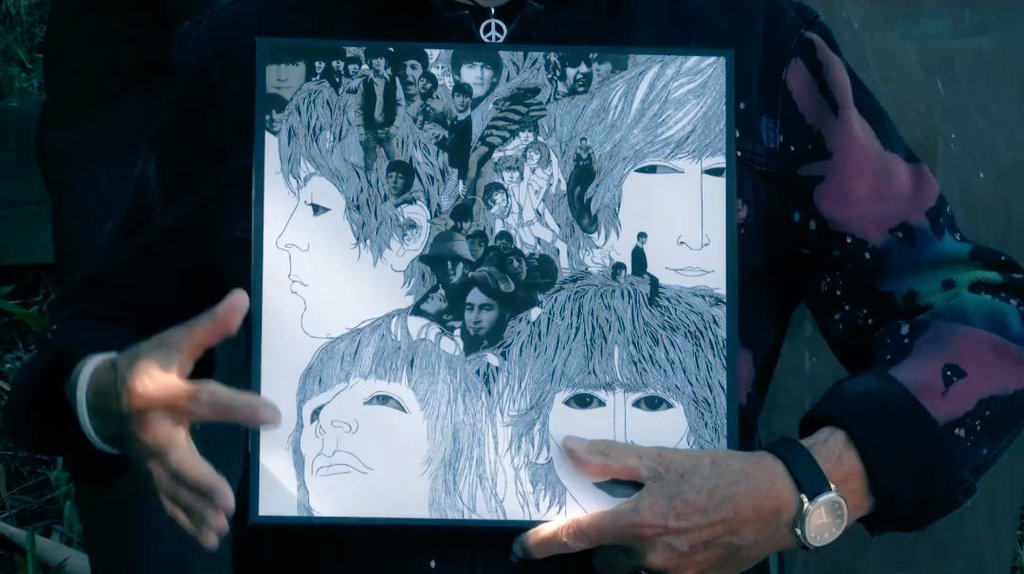
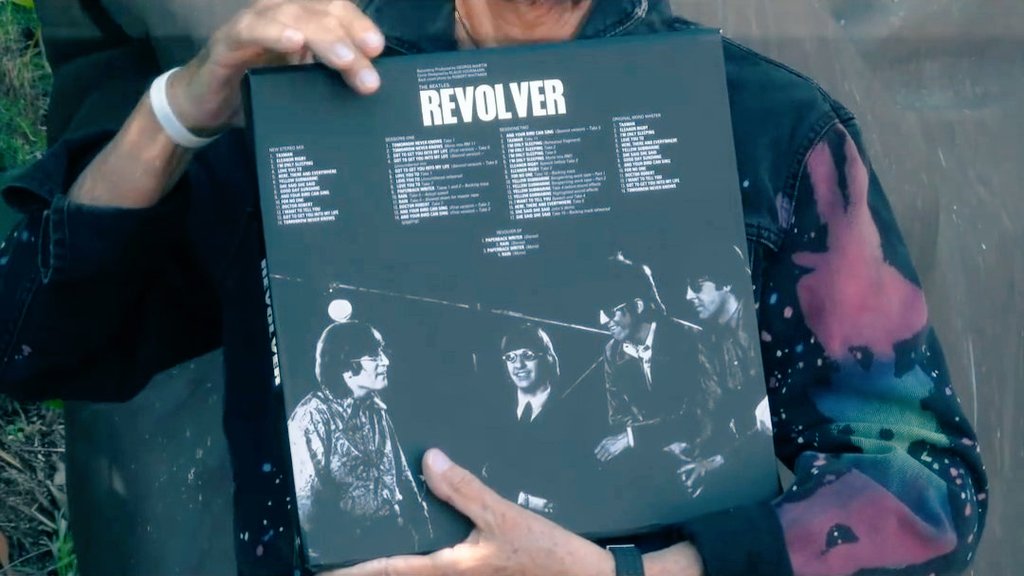
From The Beatles, October 28, 2022:
Revolver: The Beatles’ 1966 album that changed everything. Spinning popular music off its axis and ushering in a vibrant new era of experimental, avant-garde sonic psychedelia, Revolver brought about a cultural sea change and marked an important turn in The Beatles’ own creative evolution. With Revolver, John Lennon, Paul McCartney, George Harrison, and Ringo Starr set sail together across a new musical sea.
On October 28, Revolver will be released worldwide in a range of beautifully presented, newly mixed and expanded Special Edition packages by Apple Corps Ltd./Capitol/UMe. The Special Edition’s new stereo and Dolby Atmos mixes of the album’s opening track “Taxman” make their digital release debuts with today’s announcement and preorder launch.
The Revolver album’s 14 tracks have been newly mixed by producer Giles Martin and engineer Sam Okell in stereo and Dolby Atmos, and the album’s original mono mix is sourced from its 1966 mono master tape. Revolver’s sweeping new Special Edition follows the universally acclaimed remixed and expanded Special Editions of Sgt. Pepper’s Lonely Hearts Club Band (2017), The BEATLES (‘White Album’) (2018), Abbey Road (2019), and Let It Be (2021).
All the new Revolver releases feature the album’s new stereo mix, sourced directly from the original four-track master tapes. The audio is brought forth in stunning clarity with the help of cutting edge de-mixing technology developed by the award-winning sound team led by Emile de la Rey at Peter Jackson’s WingNut Films Productions Ltd. The physical and digital Super Deluxe collections also feature the album’s original mono mix, 28 early takes from the sessions and three home demos, and a four-track EP with new stereo mixes and remastered original mono mixes for “Paperback Writer” and “Rain”. The album’s new Dolby Atmos mix will be released digitally.
Revolver Special Edition (Super Deluxe): 63 tracks
Digital Audio Collection (stereo & hi res 96kHz/24-bit stereo + mono + Dolby Atmos)
5CD (stereo & mono audio) with 100-page hardbound book in a 12.56” x 12.36” slipcase
4LP+7-inch EP (stereo & mono audio) on half-speed mastered 180-gram vinyl with 100-page hardbound book in a 12.56” x 12.36” slipcase
• DISC 1: Revolver (New stereo mix): 14 tracks
• DISCS 2 & 3: Sessions (stereo & mono): 31 tracks
• DISC 4: Revolver (Original mono master): 14 tracks
• DISC 5: Revolver EP: 4 tracks
• “Paperback Writer” & “Rain” (New stereo mixes & Original mono mixes remastered)Revolver Special Edition (Deluxe): 29 tracks
2CD in digipak with a 40-page booklet abridged from the Super Deluxe book
• DISC 1: Revolver (New stereo mix): 14 tracks
• DISC 2: Sessions highlights + “Paperback Writer” & “Rain” (New stereo mixes): 15 tracksRevolver Special Edition (Standard): 14 tracks
Digital (New album mix in stereo & hi res 96kHz/24-bit stereo + new Dolby Atmos mix)
1CD in digipak (New stereo mix)
1LP (New stereo mix) on half-speed mastered 180-gram vinyl
Limited Edition 1LP vinyl picture disc (New stereo mix) illustrated with the album cover artAcross all the configurations, Revolver’s Special Edition showcases the GRAMMY-winning original album artwork created by The Beatles’ longtime friend, German bassist and artist Klaus Voormann. The Super Deluxe CD and vinyl collections’ beautiful book features Paul McCartney’s foreword; an introduction by Giles Martin; a thoughtful, enlightening essay by Questlove; and insightful chapters and detailed track notes by Beatles historian, author, and radio producer Kevin Howlett. The book is illustrated with rare and previously unpublished photos, never before published images of handwritten lyrics, tape boxes, and recording sheets, as well as 1966 print ads and extracts from Voormann’s graphic novel, birth of an icon: REVOLVER.
Following the December 1965 release of their groundbreaking album, Rubber Soul, and after wrapping up that year’s tour dates, a late decision to cancel shooting plans for a third Beatles film, A Talent For Loving, would have a significant effect on the creation of Revolver. The time allocated for filming and recording songs for a soundtrack was removed from the band’s schedule, allowing the group to take a four-month break before the Revolver recording sessions began. “One thing’s for sure,” John said a few weeks before the band’s return to the studio, “the next LP is going to be very different.”
On April 6, 1966, The Beatles gathered in Studio Three at EMI Studios (now called Abbey Road Studios) for their first Revolver recording session. With their producer George Martin flanked by recording engineer Geoff Emerick and technical engineer Ken Townsend, they went in blazing, starting with “Tomorrow Never Knows”. John’s ethereal vocals (fed from his mic through a rotating Leslie speaker), innovative tape loops – including Paul saying ‘ah, ah, ah, ah’, which when sped up produced a sound similar to a seagull’s screech – converge with Ringo’s thunderous drum pattern, George’s tamboura drone, and a backwards guitar solo. “Tomorrow Never Knows” propelled The Beatles and popular music into exciting new terrain. In an interview before Revolver’s August 5, 1966 release, Paul explained to NME, “We did it because I, for one, am sick of doing sounds that people can claim to have heard before.” Revolver’s Special Edition also features The Beatles’ first take of “Tomorrow Never Knows” from the April 6 session and a mono mix that was issued on a small number of records before the LP was recut with the correct version.
The next day, The Beatles returned to Studio Three, completed most of their “Tomorrow Never Knows” recording, and started work on the first version of “Got To Get You Into My Life”. As heard on the Special Edition’s Sessions One, this recording sounds very different from the released track. Revolver’s Special Edition also spotlights two more stages of the finished track’s evolution: an unreleased mono mix and a special mix highlighting the overdubs of three trumpets and two tenor saxophones.
One of George’s most important songwriting influences is heard in “Love You To”. The previous year, his deepening interest in Indian music and learning how to play sitar had brought him together with Ravi Shankar, who became his close friend and occasional musical collaborator. The Beatles began recording “Love You To” in Studio Two on April 11, the third anniversary of the UK release of “From Me To You”. Taken with the whole of Revolver, the short three-year span between these songs illuminates the band’s astonishing creative progression. “It was one of the first tunes I wrote for sitar,” George later recalled. “This was the first song where I consciously tried to use the sitar and tabla on the basic track.” With George on sitar and vocals, Paul on tamboura and vocal harmony, and university student Anil Bhagwat on tabla, the song’s intricate arrangement began to take shape over several takes. Overdubs included an additional harmony vocal by Paul, omitted from the released version but now faded up in a mix of Take 7. Revolver’s Special Edition also features Take 1 and a previously undocumented and only recently discovered rehearsal for the song with George playing sitar and Paul on tamboura.
Between April 13 and 16 in Studios Two and Three, The Beatles recorded their chart-topping “Paperback Writer” single (with layered harmonies, riffing guitars, and Paul’s booming bass lines) and its B-side “Rain” (achieved with tape machines slowed down for the recording and mixing processes). Prior to the single’s release on June 10 (May 30 in the U.S.), The Beatles spent a couple of days away from recording to shoot several promotional films for both songs with director Michael Lindsay-Hogg, who would later direct the Let It Be film. In addition to the songs’ new stereo mixes and original mono mixes, Revolver’s Special Edition features “Paperback Writer” Takes 1 and 2 – Backing track and two versions of “Rain” Take 5: one at the actual speed The Beatles played it and the other, a slowed down evolutionary mix used to create the master tape.
The album’s opening track, “Taxman”, was recorded across three Studio Two sessions in April and May. One of three songs on the album by George, in “Taxman” he expresses his frustration with the UK’s ‘super-rich’ tax rate at the time (90%), with a vocal wink to the “Batman” TV theme song. In a 12-hour session on April 20, The Beatles recorded and mixed the first version of “And Your Bird Can Sing” (for this song, the Special Edition features two Version One/Take 2 recordings and Version Two’s Take 5), then began recording “Taxman”. They returned to the song the next day, laying down George’s foundational guitar, Paul’s bass and his dynamic, raga-style guitar solo, and Ringo’s drums and cowbell. Revolver’s Special Edition also features Take 11, with falsetto backing vocals by John and Paul with different words from the released version.
“Yellow Submarine” was recorded on May 26 and June 1 in Studios Three and Two, respectively. The iconic, sunny rite of singalong passage for children everywhere and a favorite for the young-at-heart began quite differently than it finished. Parts 1 and 2 of the Special Edition’s songwriting work tape for “Yellow Submarine” reveal the song’s evolution from a rather sad verse sung by John over acoustic guitar – “In the town where I was born / No one cared, no one cared…” – to its adaptation by John and Paul to suit the jollier subject matter of the chorus. Revolver’s Special Edition also includes “Yellow Submarine” Take 4 and highlighted sound effects (a complex and merry sonic seascape, including Mal Evans’ sand-shoveling and Brian Jones’ glass-clinking) for listeners to journey with The Beatles through the song’s progression. “We were really starting to find ourselves in the studio,” Ringo explained later. “The songs got more interesting, so with that the effects got more interesting.”
The Beatles’ final Revolver recording session took place in Studio Two on the evening of June 21, 1966 into the wee hours of June 22, just one day before the band traveled to Munich to start their international summer tour. The lyrics for “She Said She Said” drew upon the memory of a disorienting day of misadventure The Beatles had experienced in Los Angeles. Having received George’s help to create a whole new song from some unfinished fragments, John led the group through the rehearsals and recording while the clock ticked away the last remaining session time. Revolver’s Special Edition also features John’s home demo for the song and Take 15 – Backing track rehearsal, with its introductory speech revealing convivial banter between The Beatles as they worked out the arrangement (later praised by composer and conductor Leonard Bernstein as “remarkable” with “real inventions”).
By 4am on June 22, The Beatles finished “She Said She Said”, wrapping up their Revolver recording sessions. The album’s final mono and stereo mixes were completed that evening, and the next day The Beatles were once again off and running on tour. They would next return to Abbey Road in November 1966 to begin recording Sgt. Pepper’s Lonely Hearts Club Band.
Released on August 5, 1966, Revolver spent seven weeks at number one on the UK albums chart, and a double A-side single with “Eleanor Rigby” and “Yellow Submarine” topped the UK singles chart for four weeks in August and September. In the U.S., Capitol released an 11-track version of Revolver, which spent six weeks at number one on Billboard’s albums chart. “I’m Only Sleeping”, “And Your Bird Can Sing”, and “Doctor Robert” had been previously plucked from the sessions for Capitol’s North American release of the Yesterday And Today compilation album in June. That album’s sleeve was originally printed with the infamous “butcher cover” before pre-release controversy resulted in Capitol recalling and re-covering well over one million mono and stereo LPs with an innocuous photo of The Beatles gathered around a trunk.
REVOLVER SPECIAL EDITION
TracklistsSUPER DELUXE [5CD + 100-page hardbound book in slipcase | digital audio collection]
CD1: Revolver (New stereo mix)
1: Taxman
2: Eleanor Rigby
3: I’m Only Sleeping
4: Love You To
5: Here, There And Everywhere
6: Yellow Submarine
7: She Said She Said
8: Good Day Sunshine
9: And Your Bird Can Sing
10: For No One
11: Doctor Robert
12: I Want To Tell You
13: Got To Get You Into My Life
14: Tomorrow Never Knows
CD2: Sessions One
1: Tomorrow Never Knows (Take 1)
2: Tomorrow Never Knows (Mono mix RM 11)
3: Got To Get You Into My Life (First version) – Take 5
4: Got To Get You Into My Life (Second version) – Unnumbered mix – mono
5: Got To Get You Into My Life (Second version) – Take 8
6: Love You To (Take 1) – mono
7: Love You To (Unnumbered rehearsal) – mono
8: Love You To (Take 7)
9: Paperback Writer (Takes 1 and 2) – Backing track – mono
10: Rain (Take 5 – Actual speed)
11: Rain (Take 5 – Slowed down for master tape)
12: Doctor Robert (Take 7)
13: And Your Bird Can Sing (First version) – Take 2
14: And Your Bird Can Sing (First version) – Take 2 (giggling)
CD3: Sessions Two
1: And Your Bird Can Sing (Second version) – Take 5
2: Taxman (Take 11)
3: I’m Only Sleeping (Rehearsal fragment) – mono
4: I’m Only Sleeping (Take 2) – mono
5: I’m Only Sleeping (Take 5) – mono
6: I’m Only Sleeping (Mono mix RM1)
7: Eleanor Rigby (Speech before Take 2)
8: Eleanor Rigby (Take 2)
9: For No One (Take 10) – Backing track
10: Yellow Submarine (Songwriting work tape – Part 1) – mono
11: Yellow Submarine (Songwriting work tape – Part 2) – mono
12: Yellow Submarine (Take 4 before sound effects)
13: Yellow Submarine (Highlighted sound effects)
14: I Want To Tell You (Speech and Take 4)
15: Here, There And Everywhere (Take 6)
16: She Said She Said (John’s demo) – mono
17: She Said She Said (Take 15) – Backing track rehearsal
CD4: Revolver (Original mono master)
Album tracklist (same as above)
CD5: Revolver EP
1: Paperback Writer (New stereo mix)
2: Rain (New stereo mix)
3: Paperback Writer (Original mono mix remastered)
4: Rain (Original mono mix remastered)SUPER DELUXE VINYL [limited edition 4LP+7-inch EP + 100-page hardbound book in slipcase]
LP One: Revolver (New stereo mix)
Side 1
1: Taxman
2: Eleanor Rigby
3: I’m Only Sleeping
4: Love You To
5: Here, There And Everywhere
6: Yellow Submarine
7: She Said She Said
Side 2
1: Good Day Sunshine
2: And Your Bird Can Sing
3: For No One
4: Doctor Robert
5: I Want To Tell You
6: Got To Get You Into My Life
7: Tomorrow Never Knows
LP Two: Sessions One
Side 1
1: Tomorrow Never Knows (Take 1)
2: Tomorrow Never Knows (Mono mix RM 11)
3: Got To Get You Into My Life (First version) – Take 5
4: Got To Get You Into My Life (Second version) – Unnumbered mix – mono
5: Got To Get You Into My Life (Second version) – Take 8
6: Love You To (Take 1) – mono
7: Love You To (Unnumbered rehearsal) – mono
Side 2
1: Love You To (Take 7)
2: Paperback Writer (Takes 1 and 2) – Backing track – mono
3: Rain (Take 5 – Actual speed)
4: Rain (Take 5 – Slowed down for master tape)
5: Doctor Robert (Take 7)
6: And Your Bird Can Sing (First version) – Take 2
7: And Your Bird Can Sing (First version) – Take 2 (giggling)
LP Three: Sessions Two
Side 1
1: And Your Bird Can Sing (Second version) – Take 5
2: Taxman (Take 11)
3: I’m Only Sleeping (Rehearsal fragment) – mono
4: I’m Only Sleeping (Take 2) – mono
5: I’m Only Sleeping (Take 5) – mono
6: I’m Only Sleeping (Mono mix RM1)
7: Eleanor Rigby (Speech before Take 2)
8: Eleanor Rigby (Take 2)
Side 2
1: For No One (Take 10) – Backing track
2: Yellow Submarine (Songwriting work tape – Part 1) – mono
3: Yellow Submarine (Songwriting work tape – Part 2) – mono
4: Yellow Submarine (Take 4 before sound effects)
5: Yellow Submarine (Highlighted sound effects)
6: I Want To Tell You (Speech and Take 4)
7: Here, There And Everywhere (Take 6)
8: She Said She Said (John’s demo) – mono
9: She Said She Said (Take 15) – Backing track rehearsal
LP Four: Revolver (Original mono master)
Album tracklist (same as above)
Revolver EP (7-inch vinyl)
Side 1
1: Paperback Writer (New stereo mix)
2: Rain (New stereo mix)
Side 2
1: Paperback Writer (Original mono mix remastered)
2: Rain (Original mono mix remastered)DELUXE [2CD in digipak with 40-page booklet]
CD 1: Revolver (New stereo mix)
CD 2: Sessions
1: Paperback Writer (New stereo mix)
2: Rain (New stereo mix)
3: Tomorrow Never Knows (Take 1)
4: Got To Get You Into My Life (Early mix)
5: Love You To (Take 7)
6: Doctor Robert (Take 7)
7: And Your Bird Can Sing (First version) Take 2
8: Taxman (Take 11)
9: I’m Only Sleeping (Take 2) – mono
10: Eleanor Rigby (Take 2)
11: For No One (Take 10) – Backing track
12: Yellow Submarine (Take 4 before sound effects)
13: I Want To Tell You (Speech and Take 4)
14: Here, There And Everywhere (Take 6)
15: She Said She Said (Take 15) – Backing track rehearsalSTANDARD [1CD | digital | 1LP vinyl | limited edition 1LP picture disc vinyl]
Revolver (New stereo mix)
From abbeyroad.com, September 7, 2022:
All the new Revolver releases feature the album’s new stereo mix, sourced directly from the original four-track master tapes. The audio is brought forth in stunning clarity with the help of cutting edge de-mixing technology developed by the award-winning sound team led by Emile de la Rey at Peter Jackson’s WingNut Films Productions Ltd.
The physical and digital Super Deluxe collections also feature the album’s original mono mix, 28 early takes from the sessions and three home demos, and a four-track EP with new stereo mixes and remastered original mono mixes for Paperback Writer and Rain. The album’s new Dolby Atmos mix will be released digitally.
Our mastering engineers were heavily involved in the project as Miles Showell mastered and cut the new stereo LP and 4-track Revolver EP, Alex Wharton mastered and cut the bonus material in stereo and mono, and Sean Magee mastered and cut the original mono master.
Across all the configurations, Revolver’s Special Edition showcases the GRAMMY®-winning original album artwork created by The Beatles’ longtime friend, German bassist and artist Klaus Voormann.
The Super Deluxe CD and vinyl collections’ beautiful book features Paul McCartney’s foreword; an introduction by Giles Martin; a thoughtful, enlightening essay by Questlove; and insightful chapters and detailed track notes by Beatles historian, author, and radio producer Kevin Howlett.
The book is illustrated with rare and previously unpublished photos, never before published images of handwritten lyrics, tape boxes, and recording sheets, as well as 1966 print ads and extracts from Voormann’s graphic novel, birth of an icon: REVOLVER.

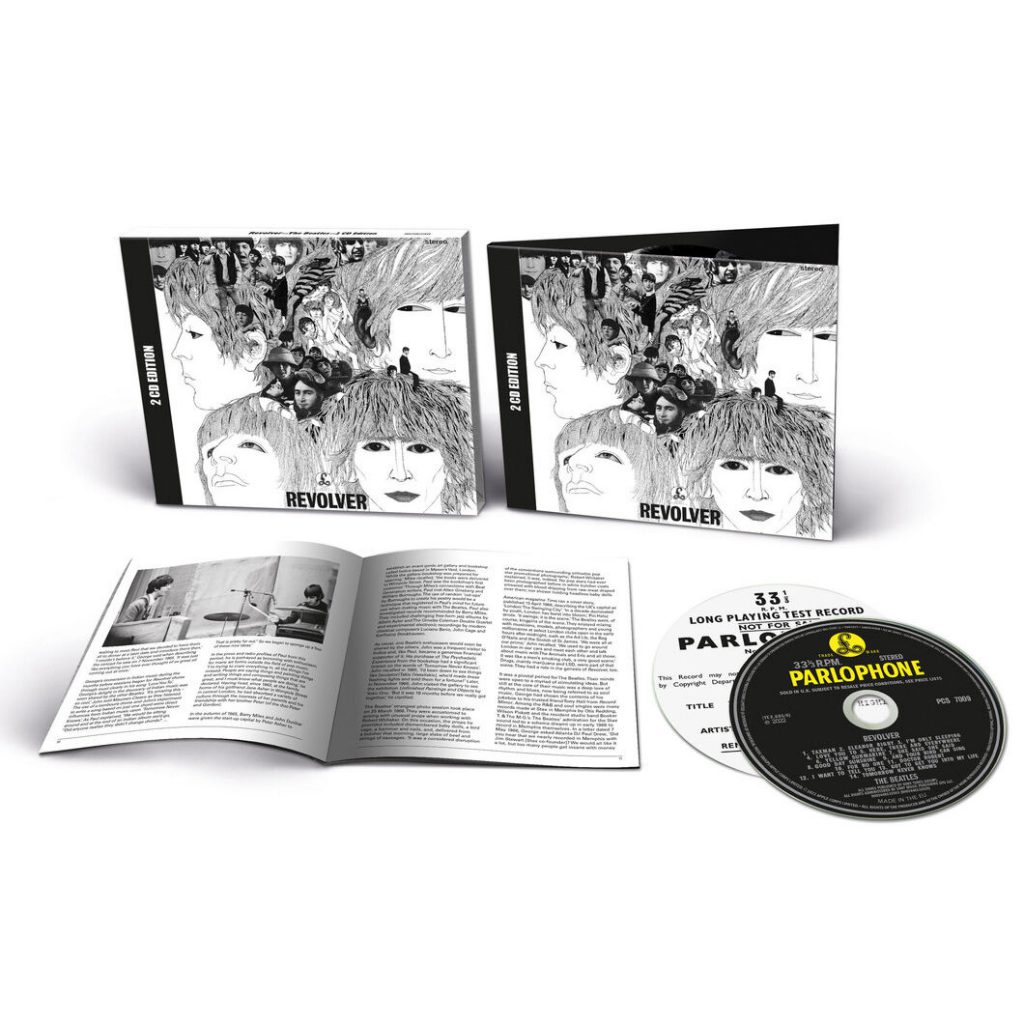
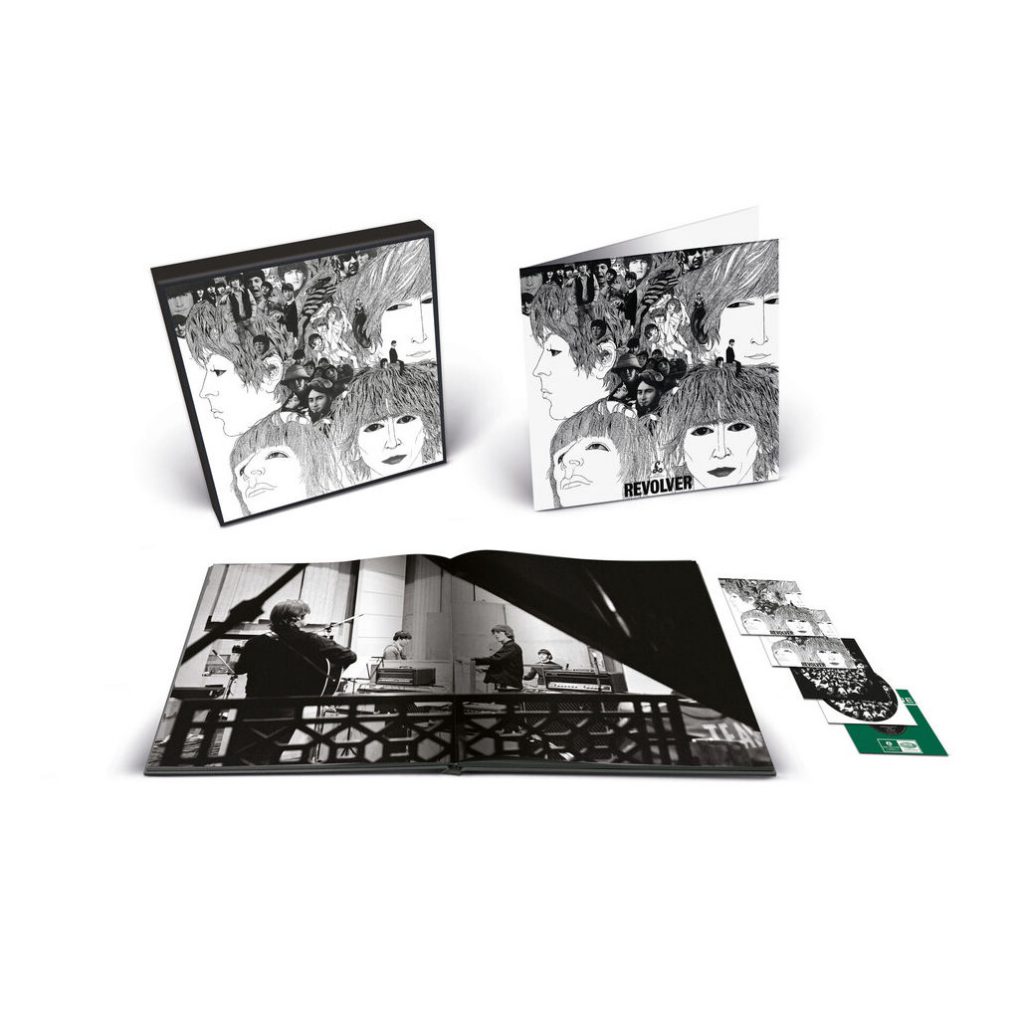

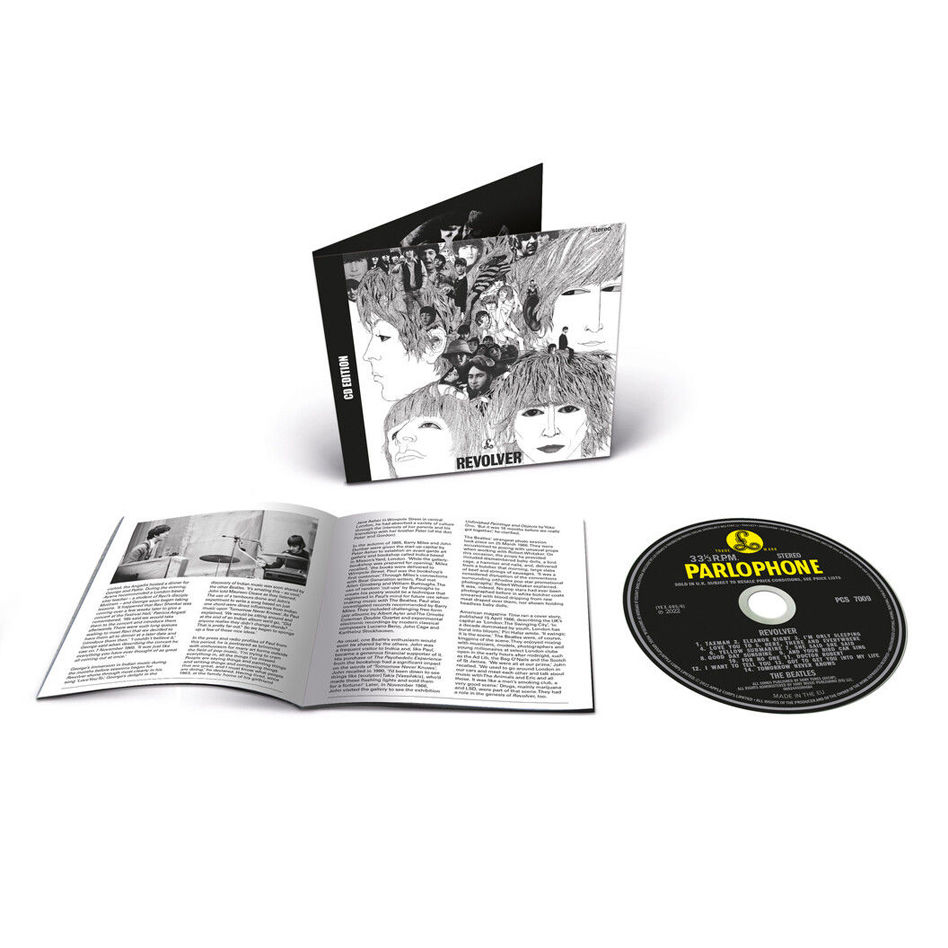
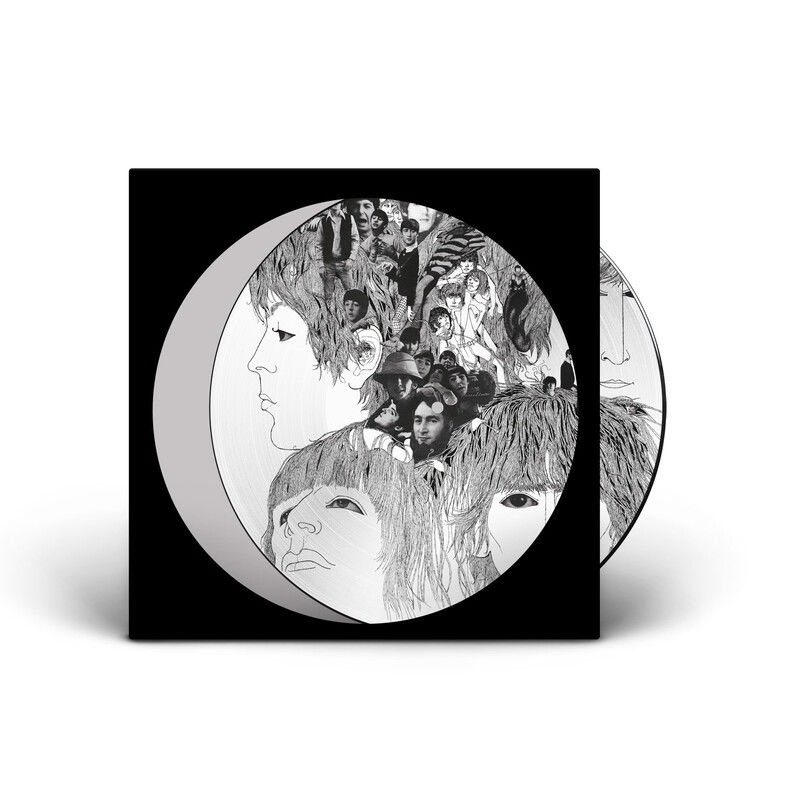
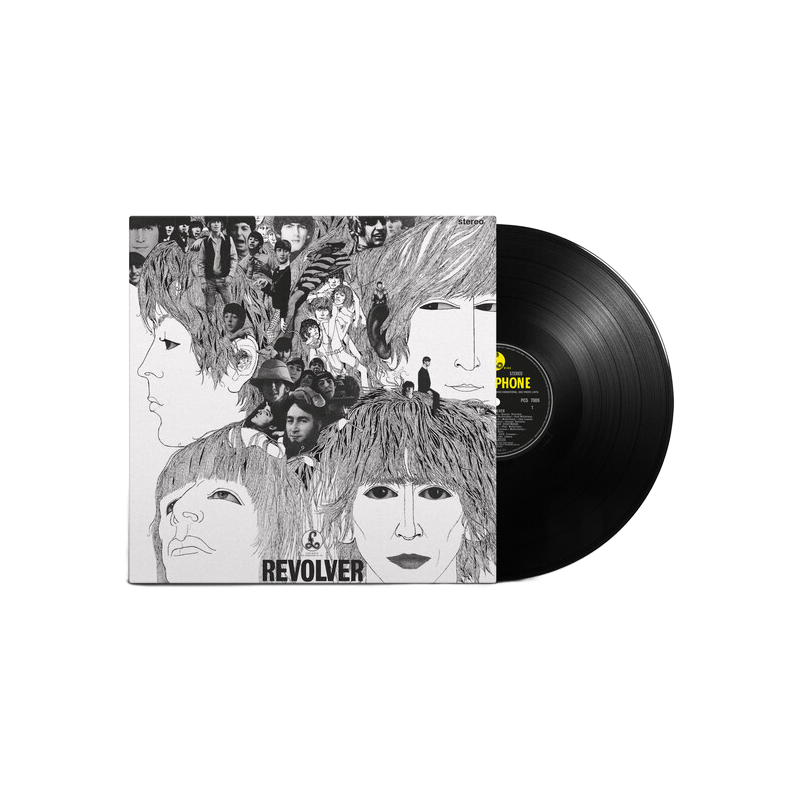

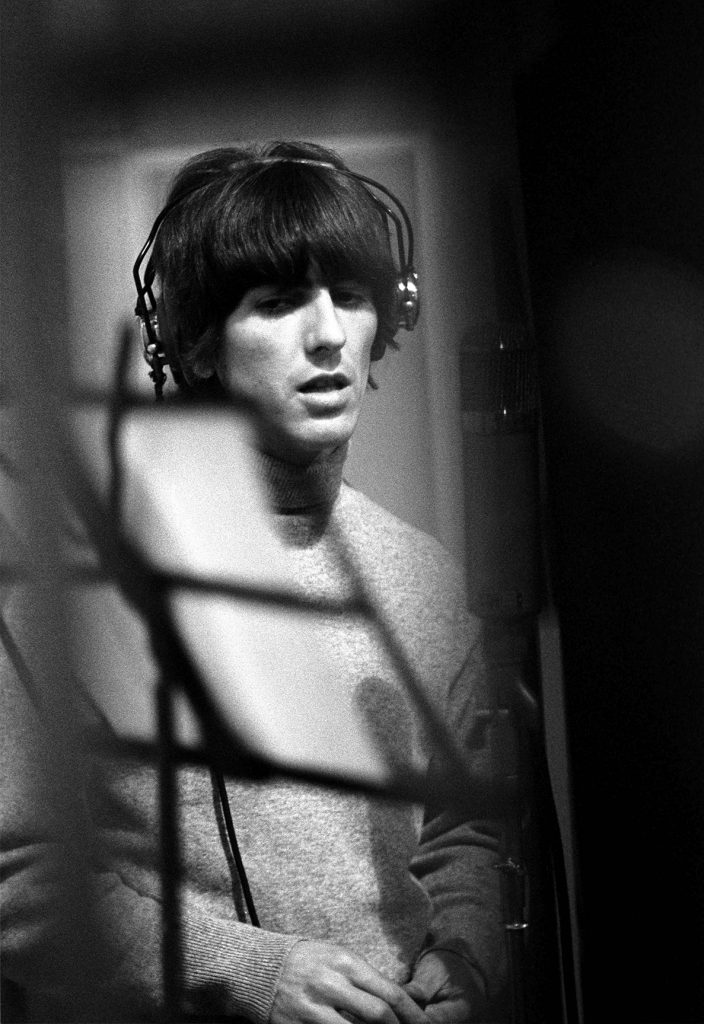
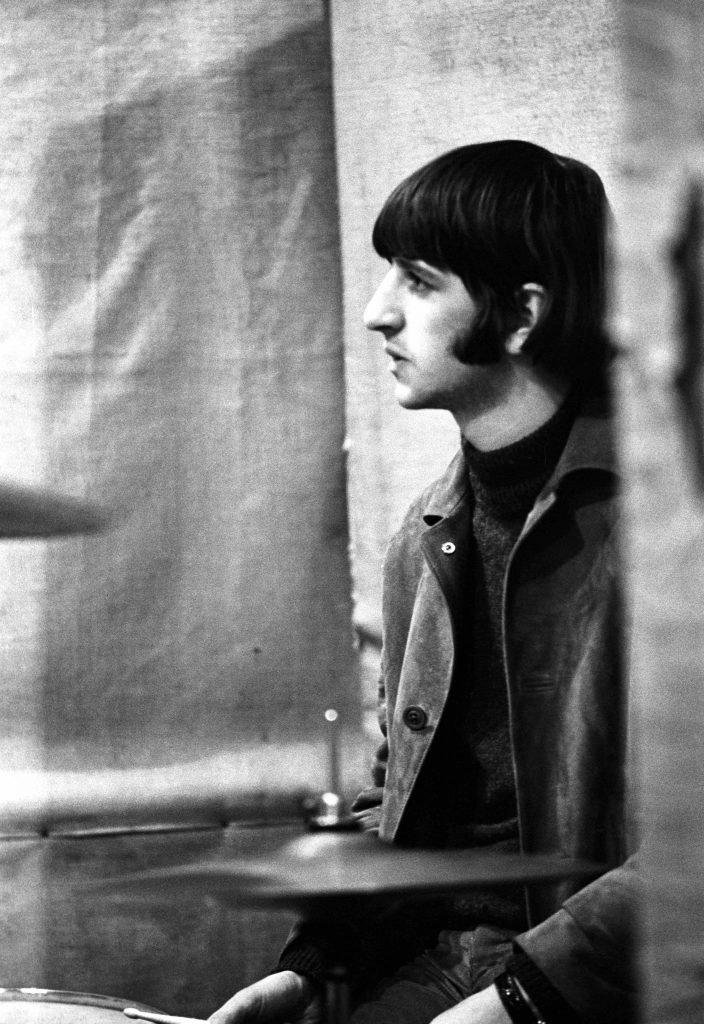
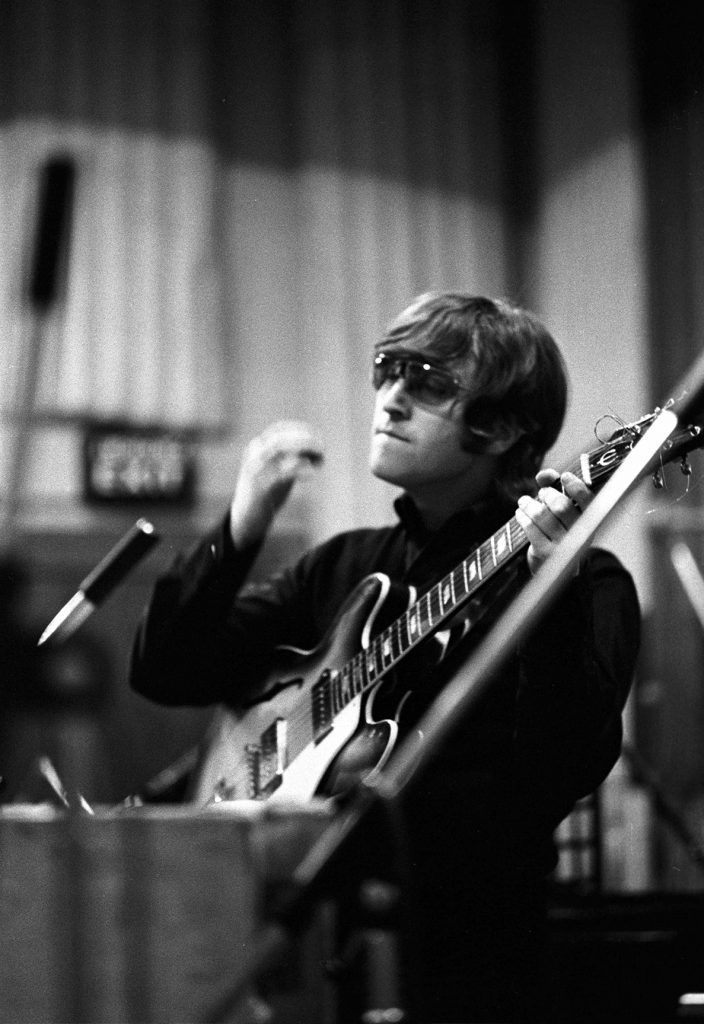
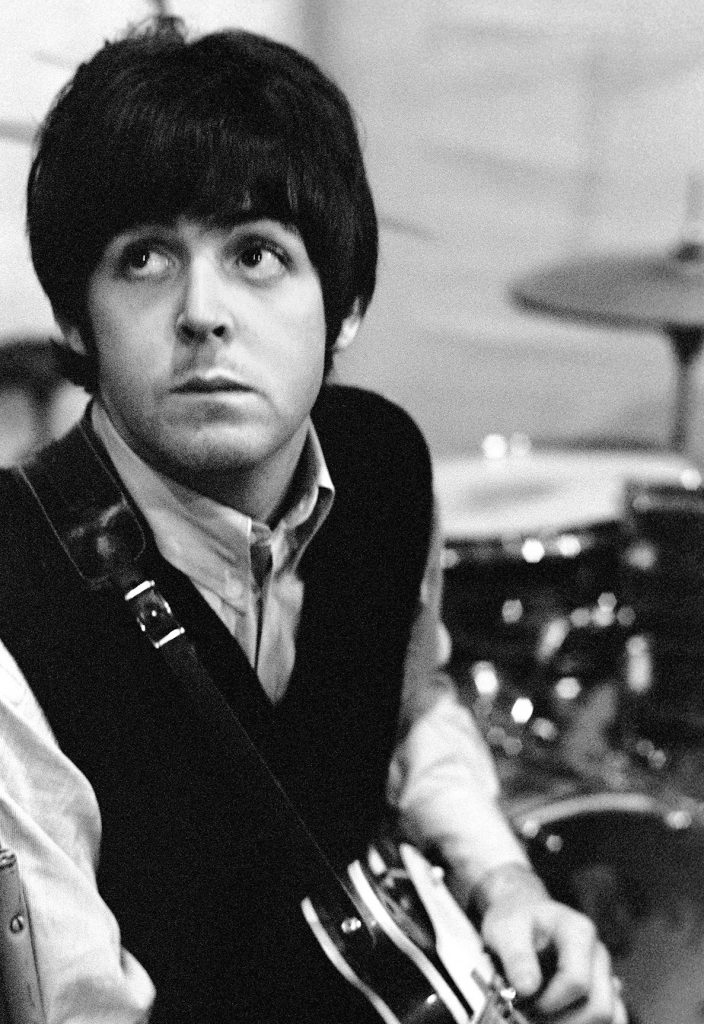
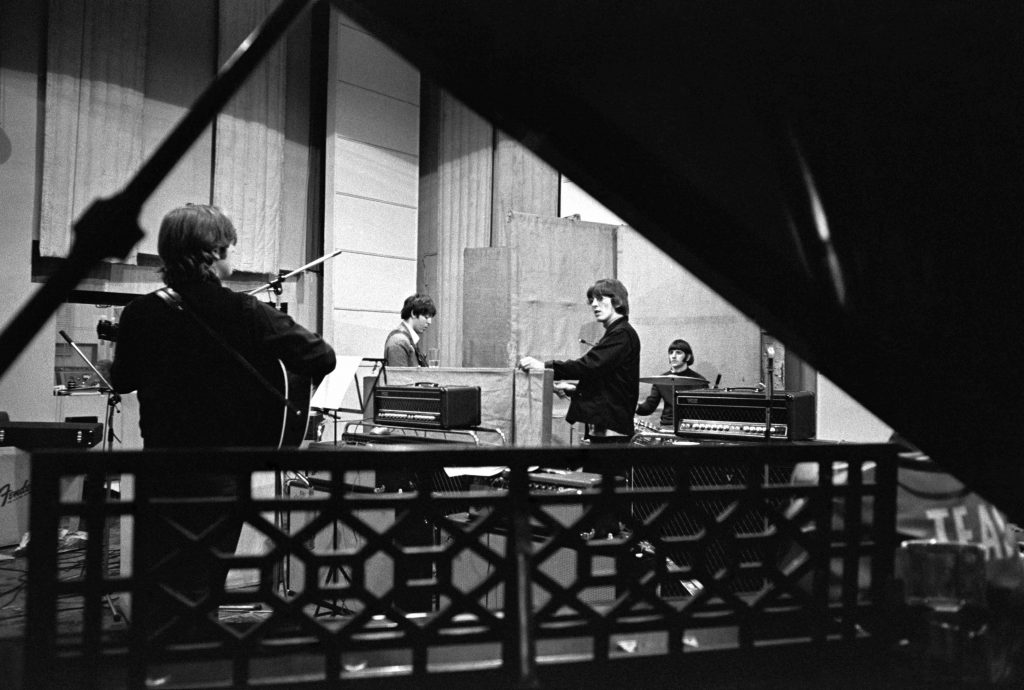
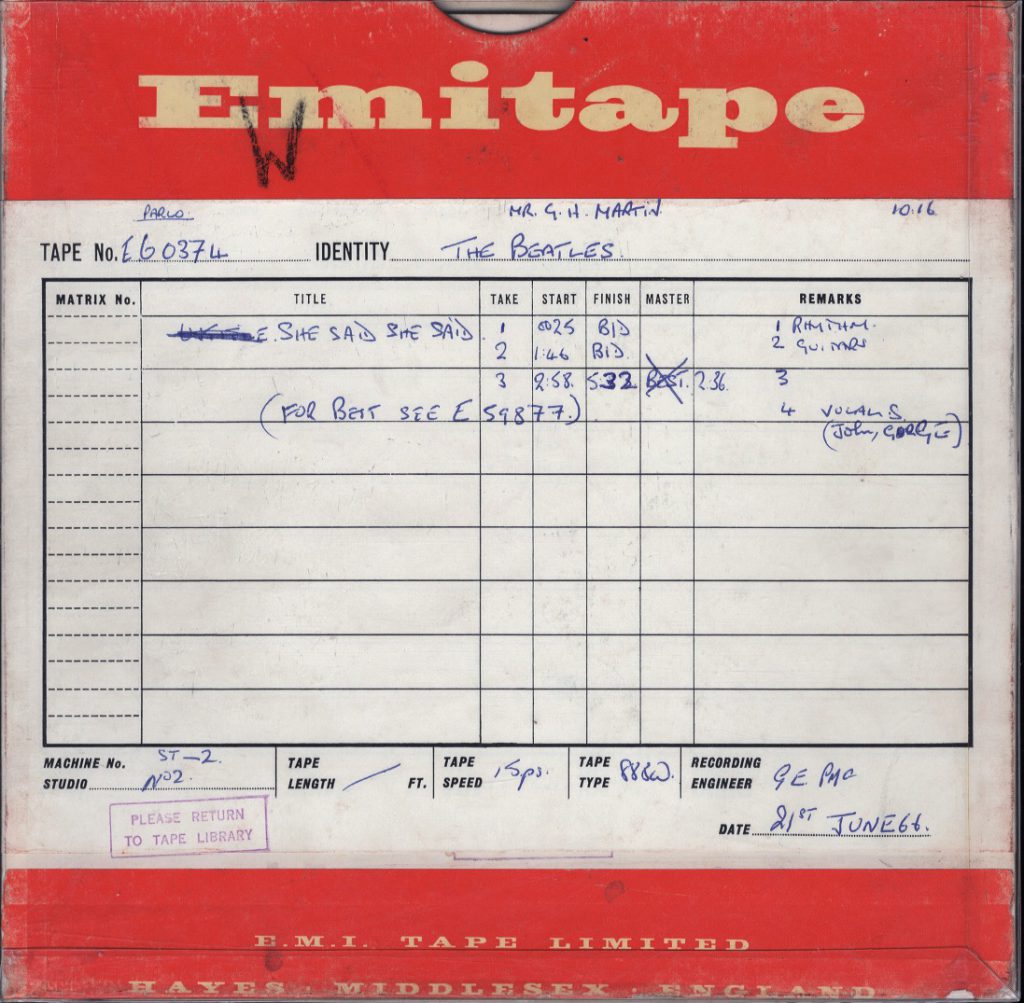
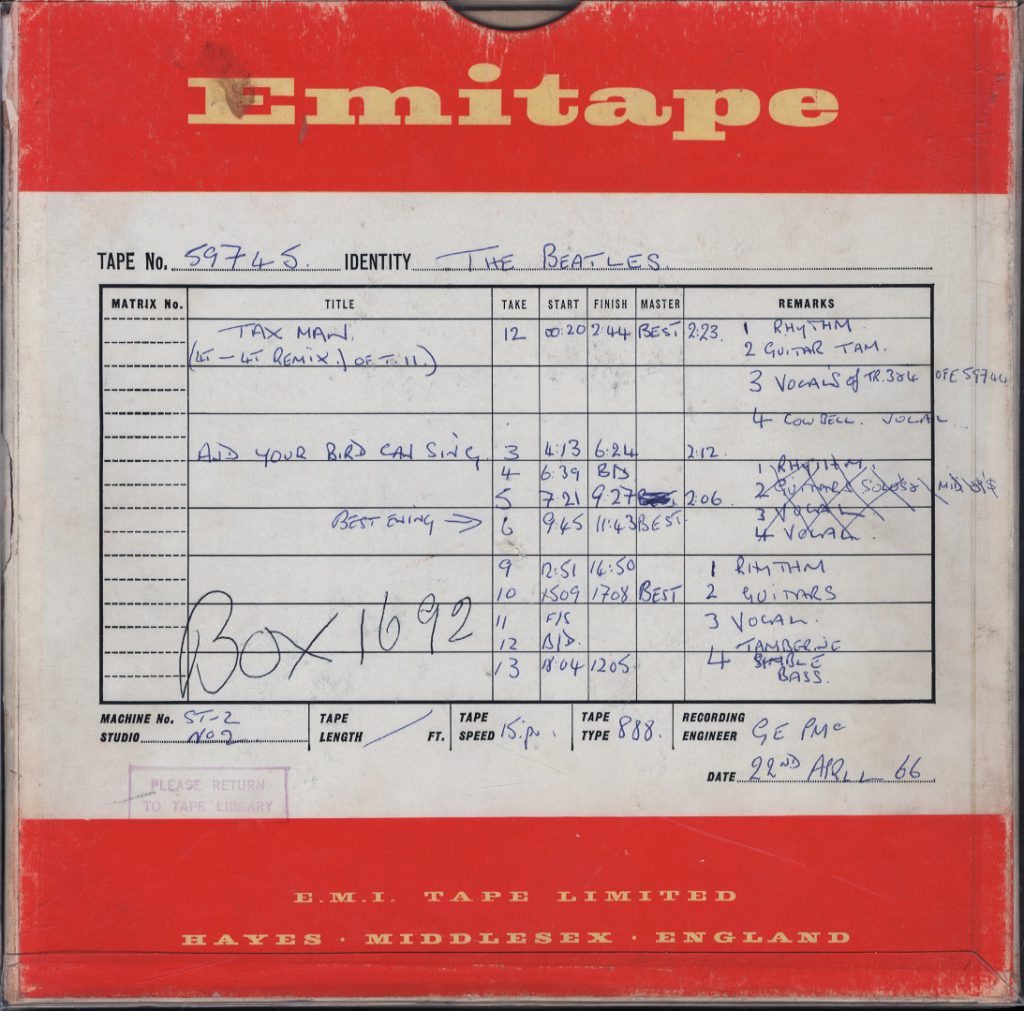

Notice any inaccuracies on this page? Have additional insights or ideas for new content? Or just want to share your thoughts? We value your feedback! Please use the form below to get in touch with us.